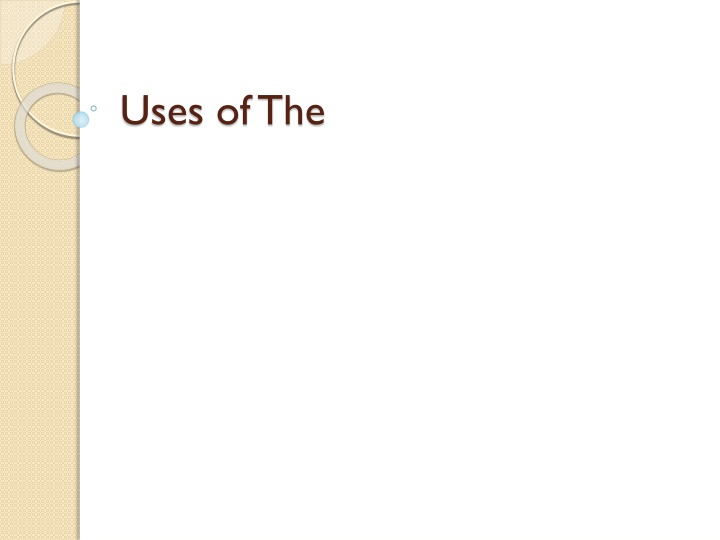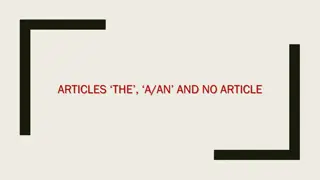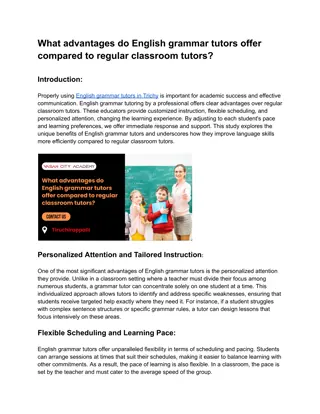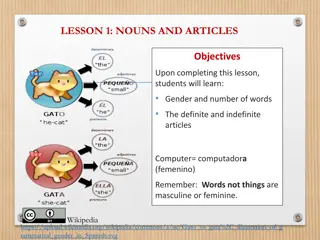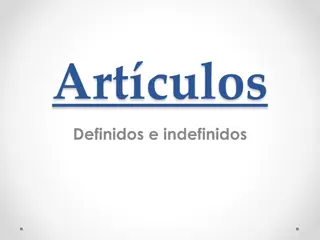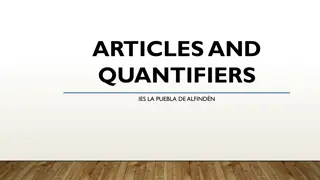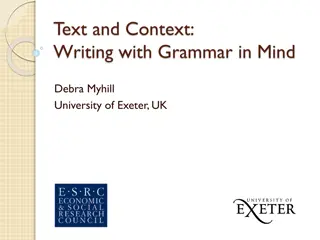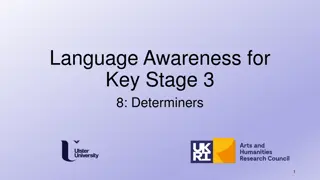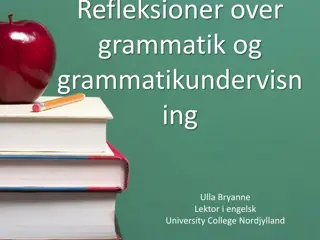Proper Use of Articles in English Grammar
Understand the correct use of definite (the) and indefinite (a/an) articles with countable and uncountable nouns, singular or plural nouns, adjectives, nationality words, and specific expressions. Learn when to use "the" with singular countable nouns and adjectives, and discover examples for clarity.
Download Presentation

Please find below an Image/Link to download the presentation.
The content on the website is provided AS IS for your information and personal use only. It may not be sold, licensed, or shared on other websites without obtaining consent from the author.If you encounter any issues during the download, it is possible that the publisher has removed the file from their server.
You are allowed to download the files provided on this website for personal or commercial use, subject to the condition that they are used lawfully. All files are the property of their respective owners.
The content on the website is provided AS IS for your information and personal use only. It may not be sold, licensed, or shared on other websites without obtaining consent from the author.
E N D
Presentation Transcript
Nouns Articles Types of articles Singular or plural Countable nouns The a an Both The = definite article a/an = indefinite articles ( an= a e u I o) Uncountable nouns The Only singular The = definite article
- We use the+ a singular countable noun to talk about a type of plant, animal.. etc. The rose is my favorite flower. The giraffe is the tallest of all animals. - In these examples, the doesn t mean one particular thing. The rose = roses in general. Note that we can also use a plural noun without the . For example: roses are my favorite flowers.
We use the + a singular countable noun when we talk about a type of machine, an invention etc. When was the telephone invented? The bicycle is an excellent mean of transport. We also use the for musical instruments: Can you play the guitar? The piano is my favorite instrument. -
The + adjective: We use the with some adjectives ( without a noun). The meaning is always plural. For example: the rich .. Here we mean rich people in general. Do you think the rich should pay more taxes?
We use the especially with these adjectives: The rich The old The blind The sick The disabled The injured The poor The young The deaf The dead The unemployed
The man over there is collecting money for the blind. Why doesn t the government do more to help the unemployed? So, these expressions are always plural. You cannot say a blind or an unemployed . You have to say a blind man , an unemployed woman
The + nationality words: You can use the with some nationality adjectives when you mean the people of the country The French are famous for their food ( French people) Why do the English think they are so wonderful?
You can use the in this way with these nationality words: the British the Welsh the Spanish the Dutch the English the Irish the French The swiss Also with nationality words ending in ese ( the Japanese, the Chinese ..)
With other nationalities you have to use a plural noun ending in s: (the) Russians (the) Italians (the) Arabs (the) Scots (the) Turks
Plural and Uncountable Nouns with and without the We don t use the before a noun when we mean something in general: - I love flowers. ( flowers in general, not a particular group of flowers) - Doctors are paid more than teachers. Unit 74
We say most people/ most dogs ( not the most ) Most people like George.
We say the.. when we mean something in particular: I like your garden. The flowers are beautiful (not flowers are) Unit 74.
The difference between something in general and something in particular is not always very clear. I like working with people ( people in general) I like working with people who are lively ( not all people but people who are lively is still a general idea) I like the people I work with ( particular group of people)
Do you like apples? ( in general) Do you like red apples? ( not all apples but red apples in general) Do you like the apples we had with our meal last night ( particular apples)
- Someone goes to hospital or is in hospital if he is ill or injured. We are not thinking of a particular hospital but we are thinking of the idea of hospital. - Jack had an accident a few days ago. He had to go to hospital. He is still in hospital now. Jill went to the hospital to visit him. She is at the hospital now.
Prison School University College Church We say: a criminal goes to prison ( not the prison). a child goes to school. a student goes to university/ college. We don t use the when we are thinking of the idea of these places and what they are used for: After I leave school, I want to go to university ( as a student)
Why arent the children at school today? ( pupils) Mrs kelly goes to church every Sunday. ( for a religious service) Ken s brother is in prison for robbery. ( he is a prisoner) We say in prison but usually at school/university/college in/at church
Mr Kelly went to the school to meet his daughter s teacher ( he didn t go as a pupil) Excuse me, where is the university please? ( a particular building) The workmen went to the church to repair the roof ( not for a religious service) Ken went to the prison to visit his brother ( he went as a visitor)
Bed Work Home We say: go to bed/ be in bed ( not the bed) It s time to go to bed now. Is Tom still in bed? We say: go to work/ be at work/ start work/ finish work ( not the work) Why isn t Ann at work today? What time do you finish work?
Go home/ come home/ be at home / stay at home ( not the home) Come on! Let s go home. Will you be at home tomorrow? There s no preposition with go/come/ arrive home ( not to home )
Revision Fill in the blanks with the or nothing: __ elephant is my favorite animal. The Who invented__ car? The Braille is invented for __ blind. The
Joan is sick. He is at __ hospital now. -- All __ bicycles have wheels. -- __ Italians are famous of their creativity. The or She went to__ school for many years. -- Don t jump on __ bed. the I like __ baseball. --
Paul is in __ prison now to visit his brother. the I liked __ music of that movie. the Kids go to __ bed at 8:00 -- __ college I go to is highly specialized. The I want to go __ home right now. --
